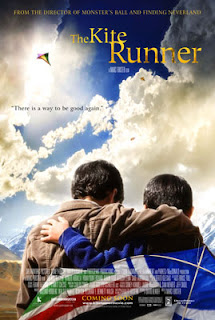The Kite Runner

The Kite Runner is a solid, earnest and not terribly dynamic film. I haven't read the Khalid Hosseini best-seller upon which it is based, but I have a feeling it is very faithful to the original, as the film unfolds in a novelistic fashion.
The story concerns two boys in Kabul, Afghanistan. Amir is a rich boy, his father thoroughly Westernized (he drives a Mustang). Hassan is the son of Amir's family servant, and he is Hazara, which is an ethnicity looked down upon by the Kabul elite, who are Pashtun. But Amir and Hassan are great friends, and Hassan protects the mild-mannered Amir as if he were a professional bodyguard. They are also skilled at a form of kite competition (when I was a kid, I was lucky to get a kite in the air, let alone have it duel with other kites). Amir is so meek, though, that he does a very cowardly thing and his friendship with Hassan is strained, and eventually the boy leaves the household with his father.
After the Soviet invasion, Amir and his father flee the country, and they end up in America. Amir becomes a novelist, and in the year 2000 he receives a call from his father's old friend, who is dying. He goes to Pakistan to visit him, and learns that Hassan has a son who needs his help, and therefore Amir must venture into the Taliban-controlled Afghanistan to rescue him.
This is a pretty good story, but what I found interesting was the stuff between the lines--particularly the film's middle section, when Amir and his father live in America. Homayoun Ershadi plays the father, and I think he gives the most interesting performance in the piece. He is some kind of intellectual and big wheel in pre-Soviet Kabul, but is reduced to working in a gas station in California. Also, it was interesting to see how even today there are communities of different ethnic groups. At one point Amir's wife mentions that "Afghan community in Virginia," which I wouldn't otherwise know existed. Clearly the U.S. is still a tremendously diverse nation, which I think is perhaps our greatest strength.
This is a pretty good story, but what I found interesting was the stuff between the lines--particularly the film's middle section, when Amir and his father live in America. Homayoun Ershadi plays the father, and I think he gives the most interesting performance in the piece. He is some kind of intellectual and big wheel in pre-Soviet Kabul, but is reduced to working in a gas station in California. Also, it was interesting to see how even today there are communities of different ethnic groups. At one point Amir's wife mentions that "Afghan community in Virginia," which I wouldn't otherwise know existed. Clearly the U.S. is still a tremendously diverse nation, which I think is perhaps our greatest strength.
But about the movie. The film is directed by Marc Forster with a kind of stolid, unfancy directness that suggests a television film. It is designed to jerk tears, and I admit there were moments that are effectively moving. There are also some moments that strain credulity, such as some soap-opera-like twists and coincidental meetings. When Amir goes into the Afghanistan there is a nice tension, but his rescue of the boy seems remarkably easy. Islamofascists (Rudy Giuliani's favorite word) seem to be the new Nazis, as they are an easy group of people to villainize, but they are also portrayed as bumbling.
Overall, I think this is a nice film, but avoids being too provocative. It would seem that Hosseini is an Afghan who strongly prefers the days when Kabul was full of men who wore Western-style clothing and could watch Hollywood films at the cinema. Is that the best thing for his country? I would imagine so, but I think the issue is more complicated, and is not really discussed in this film.


Comments
Post a Comment